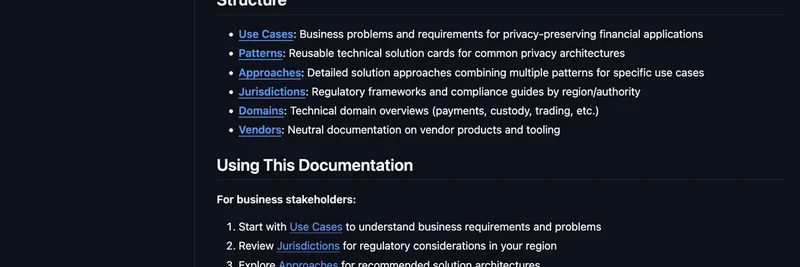Ethereum just took a big step toward making privacy a mainstream feature for institutions, and meme token enthusiasts should pay attention. The Institutional Privacy Task Force (IPTF), backed by the Ethereum Foundation, has open-sourced its initial market map. This isn't just some dry report—it's a collaborative blueprint packed with real-world use cases, technical patterns, and regulatory insights aimed at banks, custodians, and enterprises dipping their toes into Ethereum.
Posted by Mo (@motypes) on X, the announcement highlights how privacy is shifting from niche crypto experiments to institutional-grade solutions. Mo, who works on enterprise and institutional privacy at the Ethereum Foundation, shared the news quoting colleague Oskar Thoren (@oskarth), emphasizing the early-stage release and calling for ecosystem contributions. The GitHub repo is live at ethereum/iptf-map, ready for builders, researchers, and vendors to jump in.
What's Inside the Market Map?
Think of this map as a starter kit for privacy on Ethereum. It's divided into key sections to make it easy for different folks—business types, tech teams, and legal eagles—to find what they need:
Use Cases: These outline business problems and requirements for privacy-preserving apps in finance. For example, how to handle sensitive transactions without exposing everything on the public blockchain.
Patterns: Reusable tech building blocks, like solution cards for common privacy setups. If you're coding a meme token with private features, this could inspire ways to implement zero-knowledge proofs or other privacy tech.
Approaches: Detailed combos of patterns tailored to specific scenarios, giving step-by-step guidance on implementation.
Jurisdictions: Regulatory breakdowns by region, helping navigate compliance in places like the US or EU. Crucial for meme projects aiming to go global without legal headaches.
Domains: Overviews of areas like payments, custody, and trading, with Ethereum-specific privacy twists.
Vendors: Neutral info on tools and products from various providers, so you can pick the right stack without bias.
The whole thing is under a CC0 license, meaning it's public domain—free to use, modify, and share. Confidential bits, like specific pilot details from institutions, are kept separate in a non-public folder.
Why This Matters for Meme Tokens
Meme tokens thrive on hype, community, and sometimes anonymity, but Ethereum's transparency can be a double-edged sword. Front-running bots snipe trades, and on-chain data reveals whale moves that tank prices. Institutional privacy tools could change that game.
Imagine meme launches with built-in privacy: shielded transactions to hide buy sizes, or compliant ways for big funds to participate without broadcasting their strategies. As institutions adopt these patterns—validated from real banks and enterprises—meme devs get battle-tested tech for free. Plus, if privacy draws more traditional finance into Ethereum, that could mean deeper liquidity pools for your favorite dog or cat coins.
We've seen privacy-focused projects like Aztec or Railgun gain traction in DeFi, and this IPTF push could accelerate similar integrations for memes. It's not just about hiding wallets; it's enabling secure, scalable apps that attract serious money while keeping the fun, decentralized vibe.
How to Get Involved
If you're a meme token builder tinkering with privacy or a researcher spotting gaps, head to the repo and contribute. Use the templates in each folder, keep it concise, and cross-link related sections. No need for confidential info—just solid, actionable additions.
This open-source move signals Ethereum's maturity, bridging the gap between wild meme culture and polished institutional needs. Keep an eye on updates from @iptf_updates, and who knows? Your next meme project might leverage these tools to moon harder than ever.


